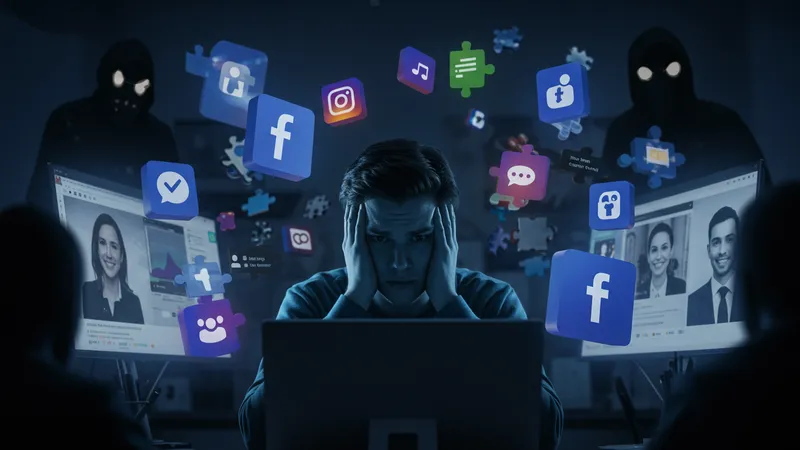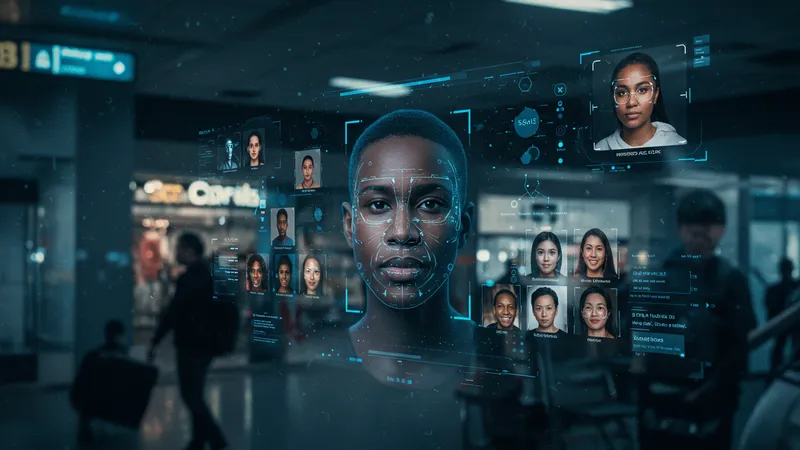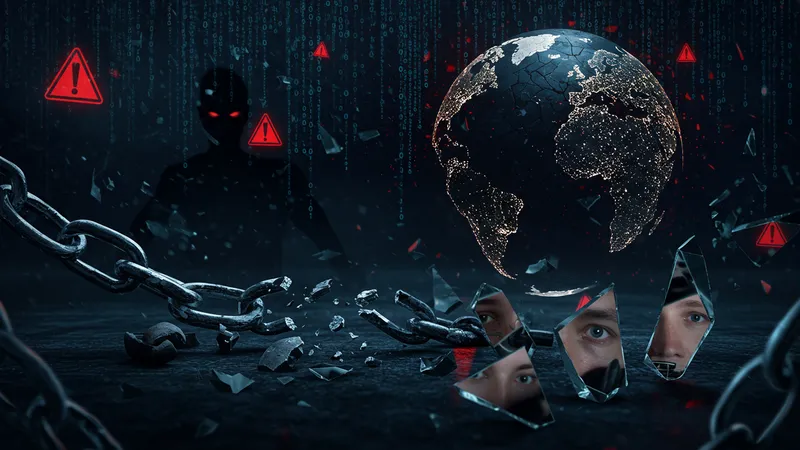

Imagine a world where every step you take is watched, every conversation recorded, and each click tracked. Sounds like science fiction? Think again. Today, protecting your personal freedoms is more critical than ever.
In an age where our every move is monitored, your rights to privacy hang in the balance. New technology means massive surveillance, but there’s a silver lining you won’t want to miss.

Here’s the kicker: despite living in a digital age, few people realize how much of their personal data is harvested and shared without their consent. Take this: more than 70% of smartphone apps share your data with third parties. But that’s not even the wildest part…
Even your smart home devices aren’t safe! Wonder why you suddenly get ads about something you just mentioned in a private chat? Yes, it’s high time to think about who might be listening. But hold on—there’s a twist to this tale you’re not expecting…
What happens next shocked even the experts—so much that they urged immediate regulatory changes. You won’t believe what else is at risk when it comes to personal privacy.

Alarmingly, digital footprints can now be pieced together to create detailed profiles of individuals. Hidden algorithms track your behavior, figuring out your habits and even predicting your next move. Advertisers and data brokers utilize these insights, leaving consumers with little awareness of the extent of their exposure. But here’s the shocking part: your personal information might already be more public than you think.
Your online identity is like a goldmine for companies hungry for consumer insights. From your shopping patterns to your location data, everything is sold to the highest bidder. Businesses can accurately predict your future purchases, turning individuals into mere data points. But, there’s more lurking beneath the surface that will make you rethink your online activities!
Many people unknowingly contribute to this issue by accepting terms and conditions without reading them. These agreements often grant companies carte blanche to exploit personal data as they see fit. The assumption of safety behind a screen is a dangerous illusion. But what if there’s a potential solution hidden in plain sight?
It's critical to understand how you can fight back and reclaim your digital freedom. Simple acts like changing privacy settings, using quality encryption, and staying informed can safeguard your information. But there's one more twist you aren't expecting that'll redefine your perspective on freedom online.

Did you know that using public Wi-Fi is one of the biggest risks to your online privacy? Open networks can be a hotbed for hackers ready to intercept data flowing from your device. Every time you connect, you risk exposing your sensitive information, including passwords and personal messages. You might think you’re safe, but think again!
A shocking 60% of travelers admit to using unsecured public Wi-Fi, blissfully unaware of the potential cyber dangers. What they don’t realize is that a simple connection to these networks opens a doorway to their device. Hackers can easily install malware, steal sensitive data, and track activities. The worst part? Most breaches happen without any visible signs.
The convenience of public Wi-Fi lures many into a false sense of security. The reality is that your seemingly innocent decision could invite unwanted eyes into your personal affairs. Hide your data behind a Virtual Private Network (VPN) for peace of mind. But wait, there’s another layer to this problem that most people overlook!
Just when you think you’ve taken the necessary precautions, another risk emerges: rogue hotspots. These legitimate-looking networks are traps set by hackers. Connecting could lead to a severe data breach. Find out next how to identify and avoid these pitfalls efficiently.

Surprisingly, what you share on social media can come back to haunt you. Oversharing personal details can give malicious individuals the tools needed to exploit your identity. From pet names to your birthday, every detail could be a puzzle piece for identity theft. Shocked? Social media can be a double-edged sword.
Hackers aren’t the only ones interested in your Facebook or Instagram posts; employers are too. Recent reports show nearly 70% of employers are snooping on candidates’ social media profiles during hiring processes. Those party photos might end up costing you that dream job. Think about it: the vast majority fail to adjust privacy settings appropriately.
It's not just about what's public versus private. Algorithms are constantly analyzing your behavior to serve targeted ads, sometimes with eerily precise timing. Beware of posting real-time images of vacations, which can signal to burglars that your home is empty. But social media's risks go even deeper than this!
The unseen threat is the third-party apps tied to your accounts. They could access your data, sometimes through sketchy permissions granted unknowingly. What you read next might change how you see these friendly apps forever.

Facial recognition technology has transcended from futuristic fiction to a real-world tool that’s reshaping how we interact with the world. However, the technology isn't without its flaws. Alarmingly, studies have uncovered a disturbing trend: higher error rates when scanning the faces of women and minorities, hinting at inherent biases in the systems.
The implications are stark—these biases could lead to wrongful arrests or misidentification in high-stakes situations. Surprisingly, however, many people remain unaware of just how pervasive facial recognition has become in their daily lives. It's not just in airports or high-security zones; it's popping up in everyday environments like retail stores and even schools.
This powerful technology raises numerous ethical questions about consent and data privacy. Remarkably, some systems can even identify individuals from blurry or partial images. But, who controls this information, and how is it protected against misuse? Brace yourself; what you’ll learn next is a game-changer for how you interact with such technology.
Some cities have already pushed for bans or strict regulations to prevent potential abuses of facial recognition. As public awareness grows, so too does the call for transparency and accountability in its use. You have a role to play in demanding these changes—and the next page will tell you how!

Behind the screens, a silent cyber war rages on, putting national security and personal data at unprecedented risk. Shockingly, nearly 80% of organizations have encountered cyber-attacks in recent times, a number that’s rapidly increasing as global tensions rise.
Cyber warfare is no longer theoretical; it's an everyday reality. Government networks are prime targets, but businesses and individuals aren’t immune. What’s surprising is how underprepared many entities remain, despite the intensifying threats of digital attacks. But vigilance can make a difference.
Countries are investing billions into defensive and offensive cyber capabilities. Yet, by some analysts' accounts, the gap between attackers’ and defenders’ capabilities is wider than ever. Enter the world of ethical hackers—often the unsung heroes in preventing onslaughts that can cripple economies or expose sensitive citizen information.
But here’s a twist: cyber warfare isn’t just about direct attacks. The psychological component, manipulating public opinion through misinformation and “fake news,” plays a significant role too. Discover next why digital literacy is crucial in combating these invisible forces.

Data breaches are becoming alarmingly common, yet the societal cost of ignoring them is often underestimated. In 2022 alone, there were a record number of breaches exposing millions of sensitive records. The ripple effect? A jaw-dropping global economic impact in the billions. But few realize the full scope of the damage until it's too late.
What starts as a seemingly minor leak can spiral into severe financial repercussions for both companies and consumers. Identity theft can lead to fraudulent transactions, tarnished credit scores, and a loss of trust in consumer-brand relationships. Shockingly, a large portion of breaches aren’t even discovered until months after the initial attack—time enough for enormous damage to occur.
Businesses are paralyzed by reputational damage, experiencing stock price plummets and audience erosion. The sad reality is many enterprises lack the needed infrastructure to predict or respond to these threats effectively. But hope is on the horizon with emerging cybersecurity advancements.
Advanced encryption methods, AI-based anomaly detection, and rigorous staff training are all part of a multifaceted approach to combating breaches. Still, it’s often the human error that remains a crucial vulnerability. Click next to learn a surprising fix that even the most sophisticated systems sometimes overlook!

Privacy laws are evolving rapidly, aiming to keep up with the technological advancements that continue to outpace regulation. In Europe, the General Data Protection Regulation (GDPR) serves as the gold standard, setting a precedent for global privacy rights. However, countries worldwide are scrambling to implement similar regulations with varying degrees of success.
The complexity of these laws lies in balancing user protection with innovation and economic interests. Businesses often struggle with compliance due to varying standards across different jurisdictions. But what’s unexpected is how consumers haven’t fully embraced their newfound rights, often unaware of the leverage they now hold over their data.
Some companies view these regulations as red tape, stifling creativity and incurring compliance costs. Yet, forward-thinking organizations are recognizing them as opportunities to build trust through transparency. It might surprise you to know: the slightest twist in public opinion can result in sweeping legislative changes.
Privacy laws are just the beginning of a new era where digital rights matter more than ever. Intrigued? The next thing you read about these laws might stir you to action.

Not all heroes wear capes; some are advocating tirelessly for your online rights. Digital freedom advocates are the unseen warriors countering intrusive surveillance and data exploitation. These watchdog groups and activists are challenging powerful corporations and governmental policies to uphold individual privacy.
Their efforts have resulted in significant victories, like influencing global privacy dialogues and urging companies to adopt user-centric policies. You may not realize it, but every time you enjoy anonymity online, it’s often thanks to these relentless campaigners. However, the battle is far from over.
The problem is that many of these champions of change struggle with visibility and funding. While their cause is critical, they need public backing to drive real transformation. Supporting these figures is more straightforward than you might expect, yet it remains one of the most impactful contributions to freedom online.
Your involvement, no matter how small, can tip the scales toward a more equitable digital landscape. Keep reading to discover simple ways you can contribute to these vital efforts.

Data monetization may spell profit for companies but brings ethical conundrums for consumers. Most people are unaware of how frequently their data is commoditized and the profits that arise from these transactions. The notion of owning personal data is more theoretical than practical in the modern digital ecosystem.
What many don’t realize is data brokers form a hidden economic powerhouse, trading your personal information under legal gray areas. This marketplace can determine what type of ads you see, influence credit scores, and even affect job opportunities. Shockingly, your everyday habits are often driving profits you’ll never benefit from directly.
The function of this monetization raises complex questions about ownership and consent. Devices and platforms collect your data ostensibly to enhance convenience but often at the cost of personal sovereignty. Isn’t it time to question who stands to gain from these exchanges?
New models offering transparency and consumer benefits are emerging. Uncovering these possibilities could reshape our understanding of data ownership. Continue to the next page for insights into emerging frameworks that could redefine your relationship with data.

The race for effective encryption has become a cornerstone of the fight for digital freedoms. From financial institutions to messaging apps, encryption ensures that only intended parties can read the content. But did you know that even the strongest encryption can eventually be broken with enough computational power?
Quantum computing poses an existential threat to conventional encryption methods. The capability to perform calculations at breathtaking speeds means that once 'secure' data may not remain private for long. But there’s a silver lining in this cryptographic crisis sweeping across tech industries.
Innovation doesn’t stop, and neither does the growth of encryption technologies. Quantum-resistant algorithms are now being developed to withstand future breaches. These advancements are gearing us toward a new era of digital communication, but are you prepared for what comes next?
The encryption narrative is more than a technical battle; it’s about keeping personal, corporate, and governmental secrets safe. Learn about the pioneering approaches that could become the norm for safeguarding your most valued data.

Digital literacy spans beyond basic computer skills—it's about understanding your rights and responsibilities in the online realm. Alarmingly, many internet users lack the knowledge to navigate their digital environments safely and effectively, placing them at risk.
Countless cyber threats, from phishing to malware, can often be mitigated through proper education. Yet, astonishingly, digital literacy is not prioritized in many educational curricula. Empowered users are key to ensuring a secure, inclusive online world, but the challenge lies in spreading this vital knowledge broadly and swiftly.
The positive news is that there are accessible resources available for anyone eager to enhance their digital literacy. Organizations and platforms offer courses and tutorials designed to elevate your understanding of cyberspace. Are you taking advantage of these opportunities?
Investing time in bolstering your digital skills could change your entire online experience, offering freedoms not previously considered. The transformations that lie on the next page could redefine what you always thought you knew about online safety.

The internet has become a hotbed for propaganda, a battleground where information is manipulated for various agendas. The magnitude of influence that online propaganda wields is both fascinating and frightening, shaking the core of modern democracies.
From fake news to deepfakes, the arsenal of tools employed to sway public opinion has grown sophisticated. Distinguishing genuine information from fabricated stories is increasingly challenging, with algorithms favoring sensationalism over facts. The depth of misinformation’s reach might surprise you.
This subtle yet relentless manipulation not only distorts realities but can also incite division and violence. Hence, there's a pressing need for media literacy as a means of defense. Civilians must become foot soldiers in an information war, armed with the skills to discern truth from deception.
Surprising as it may seem, collaborative efforts between tech companies and fact-checkers are beginning to turn the tide. But what role will you play in this dynamic struggle against misinformation? Venture to the next page to uncover your potential position in combating this virtual menace.
The hidden truths about guarding your freedoms are as expansive as they are transformative. From cyber warfare to data monetization and digital literacy, each element shapes a complex web. As you've journeyed through these revelations, the importance of safeguarding your digital landscape becomes increasingly clear. Dream of a day when your online interactions are secure, private, and free—a vision that's within reach but requires collective effort. Share this vital information, bookmark it for future reference, and champion your right to digital freedom today. Your actions might just be the catalyst needed for lasting change.